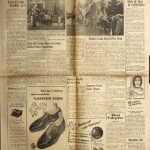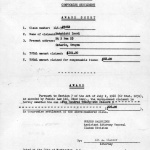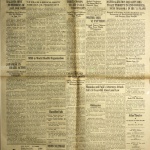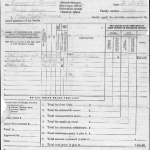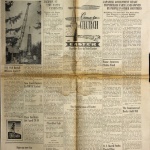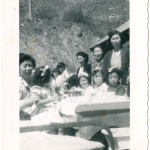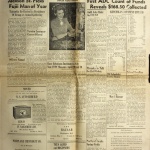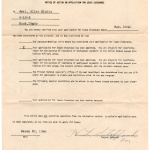Salt Lake City governors' meeting
Meeting between the War Relocation Authority (WRA) and western state governors, attorneys general, and other state and federal officials held on April 7, 1942, in Salt Lake City, Utah, to discuss the resettlement of Japanese Americans excluded from the West Coast in their states. The unanticipated hostility of state officials to Japanese Americans coming to their states led to the WRA pursuing the building of concentration camps to house the removed Japanese Americans and contributed to the resignation of the WRA's first director, Milton Eisenhower .
By April of 1942, the Western Defense Command had begun the process of systematically removing Japanese Americans from the West Coast. The first of 108 Civilian Exclusion Orders had been issued on March 24 for the Bainbridge Island , Washington, community, and subsequent orders continued through the summer. The removed Japanese Americans were sent to temporary camps built and administered by the Wartime Civil Control Administration (WCCA) that were officially called "assembly centers." A new civilian body, the War Relocation Authority , had been formed on March 18, 1942, to be the ultimate custodians for the removed Japanese Americans. Milton S. Eisenhower was appointed the first director of the WRA.
Eisenhower and many of his WRA colleagues opposed the removal of Japanese Americans and were determined to try to integrate their new charges back into the mainstream of American life as quickly as possible. As one of his first steps, he sought a meeting with western state officials to seek their support for housing Japanese Americans in their states and eventually resettling them into community life there.
The resulting meeting in Salt Lake City was attended by officials from ten states: Arizona, Colorado, Utah, Washington, Oregon, Wyoming, Montana, Idaho, New Mexico, and Nevada. Attendees included state government officials, representatives from the Farm Security Administration, and representatives of local farm associations.
The meeting began with opening remarks by assistant attorney general Tom Clark , followed by a long presentation by Karl Bendetsen , head of the WCCA and one of the primary architects of the removal. Eisenhower presented the WRA's perspective, emphasizing their desire to have Japanese Americans return to normal life as soon as possible. "It is not the province of the Authority, other than in the orderly evacuation and relocation of the Japanese, to dictate their lives," he said. "They will be encouraged to manage their affairs and their community enterprises to the highest degree." [1] As he wrote in his autobiography, his intent was to move Japanese Americans to "small inland camps on the model of Civilian Conservation Corps camps which would serve as staging areas for the evacuees as they were moved into private jobs as soon as possible and could resume something like a normal life." [2]
The subsequent response by state officials stunned Eisenhower.
Idaho attorney general Bert Miller advocated that "all Japanese be put in concentration camps, for the remainder of the war, and that no attempt should be made to provide work for them." "We want to keep this a white man's country," he added. [3]
Arizona governor Sidney Osborn: "We do not propose to be made a dumping ground for enemy aliens from any other state.... I cannot too strongly urge that such aliens be placed in concentration camps east of the Rocky Mountains." [4]
Wyoming governor Nels Smith said that his state would not "stand for being California's dumping ground." If Japanese Americans bought land in his state, he added, "There would be Japs hanging from every pine tree." [5]
The only partial exception to this perspective came from Colorado's governor Ralph Carr: "If Colorado's part in the war is to take 100,000 of them, then Colorado will take care of them," he stated, a position that would contribute to his not being reelected.
Though the reactions were vehement and racist, it was hard to argue with the core objection cited by many of the states: if Japanese Americans were indeed a security risk who needed to be removed from the West Coast due to "military necessity," what made them less dangerous inland? In vilifying Japanese Americans to justify exclusion, the federal government had created pariahs. As Eisenhower summarized at the end of the meeting, "the consensus of the meeting that the plan for reception centers was acceptable to the states so long as the evacuees remained within the reception centers under guard." [6] Concentration camps, it would have to be.
Over the next two months, the WRA selected sites for more permanent concentration camps to house Japanese Americans under armed guard. Unable to sleep at night, Eisenhower eventually resigned in June, 1942.
For More Information
Daniels, Roger. Concentration Camps, North America: Japanese in the United States and Canada during World War II . Malabar, FL: Robert E. Krieger Publishing Co., 1981.
———. Asian America: Chinese and Japanese in the United States since 1850 . Seattle: University of Washington Press, 1988.
Daniels, Roger, ed. "Report on the Salt Lake City meeting from the Records of the Secretary of Agriculture." In American Concentration Camps: Volume 4, April, 1942 . New York: Garland Publishing, 1989.
Irons, Peter. Justice at War: The Story of the Japanese American Internment Cases . New York: Oxford University Press, 1983.
de Nevers, Klancy Clark. The Colonel and the Pacifist: Karl Bendetsen, Perry Saito and the Incarceration of Japanese Americans during World War II . Forward by Roger Daniels. Salt Lake City: University of Utah Press, 2004.
Footnotes
- ↑ Roger Daniels, Concentration Camps, North America: Japanese in the United States and Canada during World War II (Malabar, FL: Robert E. Krieger Publishing Co., 1981), 93.
- ↑ Cited in Roger Daniels, Asian America: Chinese and Japanese in the United States since 1850 (Seattle: University of Washington Press, 1988), 226.
- ↑ Peter Irons, Justice at War: The Story of the Japanese American Internment Cases (New York: Oxford University Press, 1983), 72.
- ↑ Klancy Clark de Nevers, The Colonel and the Pacifist: Karl Bendetsen, Perry Saito and the Incarceration of Japanese Americans during World War II (Salt Lake City: University of Utah Press, 2004), 140–41.
- ↑ Daniels, Concentration Camps North America , 94.
- ↑ Irons, Justice at War , 72.
Last updated Jan. 22, 2024, 10:45 a.m..

